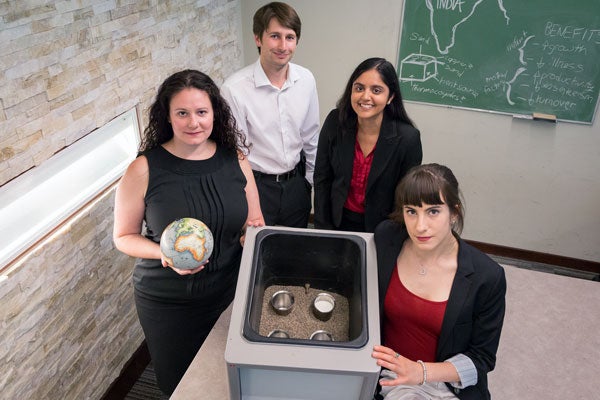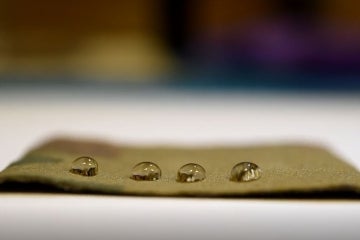
Tackling dirty water, childhood hunger
Published: October 8, 2014
Canadians often take safe drinking water and a stable food supply for granted. But in many parts of the world, people are much less fortunate.
Two recently-announced Grand Challenges Canada (GCC) grants will allow U of T Engineering researchers to bring their expertise to bear on some of the most urgent global health issues using scientific, technical, social and business innovation.
The grants were included in the latest round of GCC grants, with two previous grants this year given to U of T engineers for new methods that detect defective drugs and a 3D printer that makes skin grafts.
The latest two project teams will receive $112,000 in seed funding to implement their innovative products in the developing world.
Fighting childhood malnutrition one bottle at a time
Breast milk is a complete meal that gives infants all they need to thrive. But millions of women in the developing world must return to work quickly – which means the end of breastfeeding and the start of malnutrition that can have life-long effects for the child.
A new project in Dhaka, Bangladesh, called Mother’s Milk, will install hospital-grade breast pumps in factories where women work, along with a simple heating system so that breast milk can be pasteurized on site in as little as 30 seconds. Mothers will be able to safely store the milk to help feed their babies when they are away from home.
“Our goal is to lower the rate of infant malnutrition,” said PhD student Scott Genin, a member of the project team. “As a side benefit, we anticipate that factories with this system will also have lower worker turnover, as this will be an attractive benefit for their workers.”
The design was created through the ‘Interdisciplinary Approach to Global Challenges’ course offered through the Centre for Global Engineering – where the Mother’s Milk project team of Scott Genin, MBA student Puja Madhok (Rotman School of Management), and master’s students Micaela Collins (Dalla Lana School of Public Health) and Marta Blackwell (Munk School of Global Affairs) first met. The group is led by Professor Joseph Wong (Munk School of Global Affairs) and Dr. Sabrina Rashid (International Centre for Diarrhoeal Disease Research, Bangladesh).
Trying to clean up drinking water? Turn to the sun
Yu-Ling Cheng, director of U of T’s Centre for Global Engineering, is working with collaborators in Bangladesh to address one of the most serious health issues in the developing world: access to clean drinking water.
In areas like coastal Bangladesh, large parts of the population depend on rainwater that is collected from roofs during the rainy season and stored in cisterns for use during the months-long dry season. Often this rainwater is not very clean to begin with, and nasty pathogens can multiply in the water during the long months of storage, creating an even greater health hazard for millions of people.
Professor Cheng’s team is harnessing the sun’s UV light to improve the quality of the water as it is collected, treat it during storage and then further decontaminate it just before it’s consumed. Called Enhanced Solar Disinfection (eSODIS), the method will use ingenious cistern design and a small “just-in-time” solar-activated disinfection/dispensing module to increase the effectiveness of UV disinfection.
“I am proud of all of the projects that have come out of the Centre for Global Engineering, including the two being funded here by Grand Challenges Canada,” said Cheng. “They are examples of really important problems in the developing world where the skills and expertise of our faculty members and students can be applied to great effect.”



